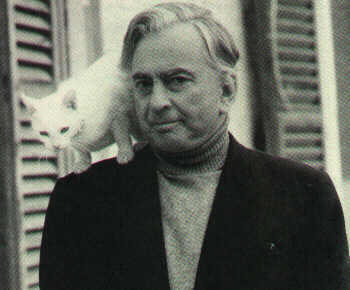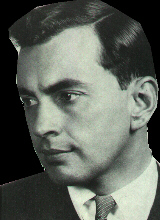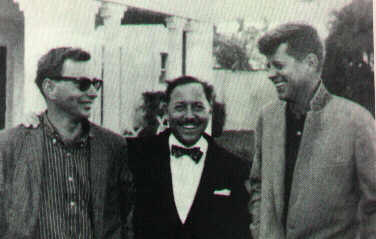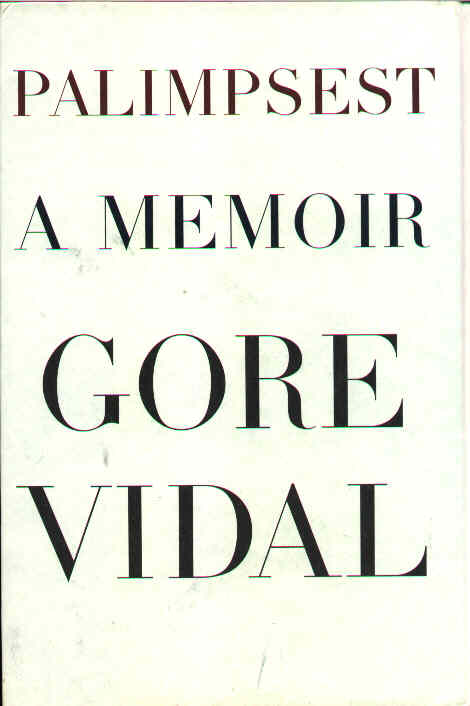 |

|
 Gore Vidal and The White Cat (Photo: Palimpsest) |
| By Jesse Monteagudo
Gore Vidal is an American Renaissance Man. A novelist, playwright, essayist, mystery writer, screenwriter, social critic, literary critic, congressional candidate, political activist and actor, Vidal exemplifies the term "multifaceted."
 As son of civil aviator Eugene Vidal and of Nina Gore
Vidal Auchincloss Olds, and as grandson of Oklahoma's "blind senator" Thomas
P. Gore, Eugene Gore Vidal, Jr. was part of America's political, social and
cultural elite from the day he was born. As son of civil aviator Eugene Vidal and of Nina Gore
Vidal Auchincloss Olds, and as grandson of Oklahoma's "blind senator" Thomas
P. Gore, Eugene Gore Vidal, Jr. was part of America's political, social and
cultural elite from the day he was born.
In an ideal world, Vidal would have enjoyed a career in politics, perhaps even the presidency. Unfortunately, Vidal's unorthodox sexuality barred him from a position enjoyed by men who were less talented but who were more successful at hiding their sexual exploits (present occupant excepted). Vidal's failure as a politician may account for his cynical view of American politics and his string of brilliant historical novels, from Burr to Washington, D.C., which provides a "Vidal's eye" view of American history. Gore Vidal chronicled the first 39 years of his amazing life in Palimpsest: A Memoir (1995). Written in Vidal's "paradise" in Ravello, Italy -- just after he received a well-publicized visit from "Lady Clinton" -- Palimpsest features a cast of the rich and famous whose paths cross the author's: Marlon Brando, Truman Capote -- with whom Vidal carried on a lengthy bitchfight that only ended with Capote's death -- Christopher Isherwood, Jack Kerouac, Anais Nin, Tennessee Williams ("the glorious Bird"), Jacqueline Bouvier Kennedy Onassis -- whose stepfather, Hugh Auchincloss, was previously married to Vidal's mother -- and Jackie's brilliant, faithless husband, John Fitzgerald Kennedy.

Vidal (left) with Tennessee Williams and John F. Kennedy (Photo: Palimpsest) Gay liberationists always had a problem with Gore Vidal. To this day Vidal refuses to label himself as "gay" or "homosexual," viewing the latter as an adjective and not a noun. Still, as Palimpsest makes clear, Vidal's sexual affinity is toward other males .
"I not only never encountered the other half [again], but by the time I was twenty-five, I had given up all pursuit, settling for a thousand brief anonymous adhesions ... where wholeness seems, for an instant, to be achieved." Vidal goes so far as to dismiss his long-term relationship with Howard Austen, which has lasted for almost half a century, as a sexless liaison. Like other "same-sexualists" (his own term), Vidal did not mope around waiting for Mr. Right to return from the grave. Vidal's sex life coincided with the golden age of promiscuity (1945-80), after penicillin and before AIDS. "Naturally, like most men, I am attracted to adolescent males ... But I did not go prowling for fourteen-year-old athletes." Still,Vidal, like Walt Whitman, spread his affections far and wide, mostly with young men and always on top -- even Jack Kerouac played the bottom with Vidal. "I calculated, at twenty-five, that I had had more than a thousand sexual encounters, not a world record (my dear contemporaries Jack Kennedy, Marlon Brando, and Tennessee Williams were all keeping up), but not bad, considering that I never got a venereal disease like Jack and Marlon or suffered from jealousy like Tennessee." Those were the good old days. As I mentioned before, Vidal's open "bisexuality" ruined his chances of making it in politics. Vidal's literary output didn't help matter any, either. Books like The City and the Pillar (1948) and A Thirsty Evil (1956), with their frank depictions of "same-sexualists," made Vidal unpopular with the masses. The City and the Pillar, one of the first accounts of male love in American literature, made Vidal a literary outcast. "In order to make a living, I was forced into television, movies, theater, and the essay", as well as writing mysteries under the nom de plume of "Edgar Box." Only in 1964, with the triumph of his historical novel Julian, did Vidal return to the novel "after ten years as a commercialite." Though Vidal's books cost him a political career, they ensured him a place in gay literature. Edmund Miller, in The Gay and Lesbian Literary Heritage, wrote that Vidal "is important for the gay literary heritage because of the straightforwardness with which he has pursued gay themes and included gay characters in his work, beginning in his teens when he wrote his first novel, Williwaw (1946). He has also steadily upped the ante about what sorts of gay material could be included in his mainstream works and as a result has made it easier for a wide range of other writers to find public acknowledgment of their material." Books like Myra Breckinridge (1968) and Myron (1974) pushed the envelope in both style and content. Even his essays, though controversial, are literary masterpieces.
 Like many other writers, Vidal's life is more interesting than his
books, and Palimpsest is Vidal at his best, which is as good as it gets. As
one of the last survivors of a brilliant generation of gay writers and
thinkers, Vidal helped pave the way for the political, social and literary
freedoms we enjoy today. Like many other writers, Vidal's life is more interesting than his
books, and Palimpsest is Vidal at his best, which is as good as it gets. As
one of the last survivors of a brilliant generation of gay writers and
thinkers, Vidal helped pave the way for the political, social and literary
freedoms we enjoy today.
As we witness the brutality and corruption of American politics today, we can imagine Vidal, sitting in his home in Ravello, turning to the person next to him and saying, in effect, "I told you so." And he is right. |
© 1997-98 BEI
 Jimmie Trimble
Jimmie Trimble